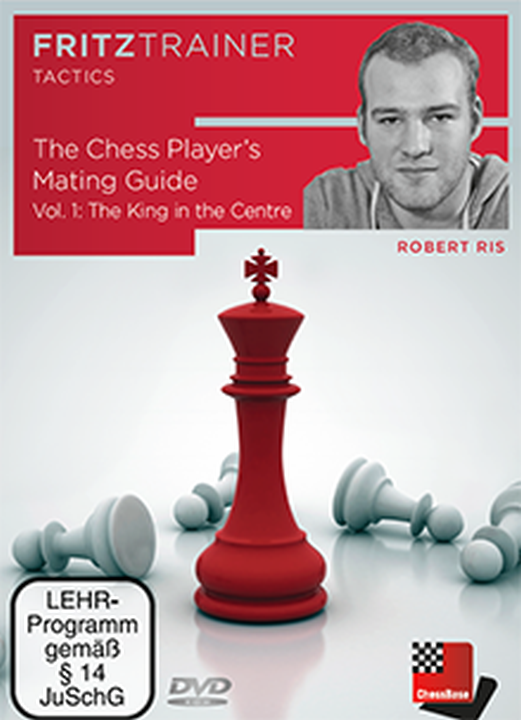A review
I chose this DVD because I had 7 hours to kill. My wife and I were driving to Florida. But since my wife is a total control freak, I wasn’t allowed to drive. Of course, there was the radio. But the programs played on it were strictly of her choice.

So I had to have something for myself during this long journey.
As soon as I hit the play button, Ris treated me with a beautiful example from the Smith-Morra gambit. In the final position, Black had all his pieces on their original squares when his king was caught in a mating net.
But the DVD also treats many other important topics, like different kinds of sacrifices (for example, sacrifices to destroy the pawn shield in front of the enemy king, or sacrifices to open lines or create space), how to destroy a closed center, the importance of the e-file and even some esoteric topics like exploiting a complex of weak squares. All this is covered in ten different chapters which contain one or more illustrative games per chapter.
The subject of this DVD is of the utmost importance because we all tend to miss chances in our games. And among these are missed opportunities which could have led to memorable victories.
In fact, in the DVD, Ris showed that even masters aren’t immune to this. While commenting on some of his own games, he didn’t shy away from pointing out how many times he had missed playing a stronger move which could have ended the game sooner.
The DVD comprises 20 tutorial videos (plus one for the introduction) and 10 puzzle clips in which Ris presents some positions and asks the viewer to find the right move. If the wrong move is entered, a feedback is given; if the entered move is right, Ris explains why the move was the best choice.

An example from the puzzles using the ChessBase interactive training system
Ris elucidated upon the game from the beginning. When the critical position was reached, he used the interactive training system and posed the following questions:
- How do you proceed with white?
- How do you take advantage of white's development?
Take this opportunity to find the solution to the position above; it will be quite surprising!
Here's the game with annotations by GM Motylev. However, Ris has commented on the game till the end. So it is quite pleasant to watch the video and learn from him.
The DVD comes with a database of 80 additional games. Some of these games are annotated by Ris and can be used to learn more about the themes treated in the chapters of the DVD.
I'd like to show you a couple of these games because I was not aware of them and I'm sure the readers will also find them exhilarating. After all, how often do we see a world champion to lose in 12 moves?

Any guesses who this world champion was?
I think the selection of games was particularly important. In the beginning, I watched the games using famous names as selection criteria. But then, I began to watch in chronological order and I discovered that Ris had followed the themes he had taught in the videos. It was quite stimulating when I was able to discover what the theme of the game was and what Ris was trying to teach through that game!
One of the games in the 80 games database was by Morphy, one of the best players to learn about development. However, there was a suspicious annotation in the following diagram.
The annotation went 17.Rxe7 Kf8 18.Re5 c5 with decisive advantage for Black. I disagreed because I thought all Black pieces are on the wrong side of the board while White pieces are centralized on open files; it is impossible Black is winning.
I asked myself if there was a better move than 18.Re5 and I thought of 18.Rb1. But I also thought how I would play after 18...c5 and found 19.Nd4. I'm not claiming that the moves I have suggested are the best. I haven't checked them with an engine. But the point I'm trying to make is that if one thinks he can learn chess by just being force-fed on Ris' videos, or just passively watching the games he has collected, he's in for a bad surprise. Chess learning cannot come in that way. One needs to be involved in the material. Hence, I made a note of all these positions I didn't understand. Next week, I'll meet my studying partner and show them to him!
Another reason for watching the games on the DVD is to stimulate our own attacking skills. For example, Morphy's games are like watching a Tal on steroids! (Or for the millennial generation Hulk on a rage spell!)
 In my opinion, this kind of DVD, with topics of general interest especially to amateurs, can also be used by chess coaches for giving some interesting positions to their students.
In my opinion, this kind of DVD, with topics of general interest especially to amateurs, can also be used by chess coaches for giving some interesting positions to their students.
But the most important part is that thanks to Ris' videos (especially when he points out some important moments in the game), we become more skilled in analyzing our own games and understand what went wrong and when, and eventually learn to recognize some manoeuvres played by professionals in their games.
To conclude, the DVD is great to learn the use of the open e-file against the enemy king in the centre or to reinforce such knowledge if one has already studied such material. It also teaches how to destroy a closed centre using many games from greats like Kasparov as examples.
Before signing off, I would also like to tell readers that this DVD is part of a series. ChessBase has recently published its second volume which I will acquire before the trip back from Florida!
The attention will be paid to the castled king and in particular on ways of exploiting the weakened kingside. Several well-known themes, pawnformations and other attacking weapons are covered in 8 chapters.




















 In my opinion, this kind of DVD, with topics of general interest especially to amateurs, can also be used by chess coaches for giving some interesting positions to their students.
In my opinion, this kind of DVD, with topics of general interest especially to amateurs, can also be used by chess coaches for giving some interesting positions to their students. 




